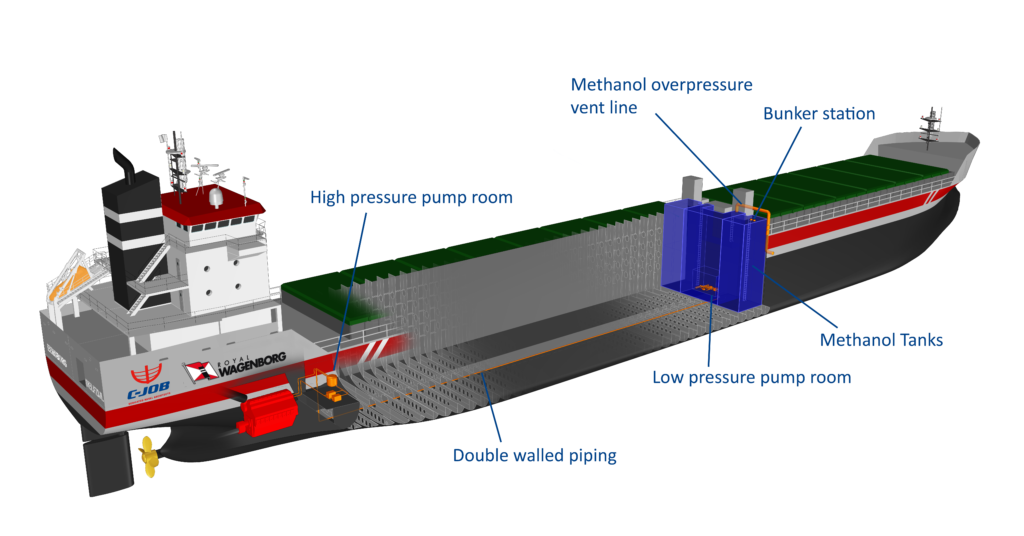Methanol is already well-established as an alternative fuel. While the main production of methanol still relies on ‘grey’ production, new technologies to produce ‘green’ methanol are on the rise. C-Job believes methanol will be one of the sustainable fuels used in the maritime industry.
What is methanol?
Methanol, CH3OH, is a light flammable liquid. It consists of hydrogen (H), oxygen (O), and carbon (C).
Methanol is the shortest/simplest form of alcohol. Traditionally methanol is produced with fossil fuels also known as ‘grey’ methanol. Alternatively, methanol can also be made in a sustainable way either using carbon-neutral biomass or renewable synthetic production both resulting in green methanol. Renewable synthetic production uses CO2 sourced from the air by means of air separation and hydrogen obtained from the electrolysis of water followed by methanol synthesis.
Methanol as a maritime fuel
Methanol is already well-established as a fuel. It has no sulfur oxide (SOx) and particulate matter emissions. When produced in a sustainable way it is CO2 neutral from well to propeller. In terms of storage, methanol can be stored at atmospheric conditions and requires less volume than, for example, ammonia. These conditions make the fuel more practical and less expensive in terms of capital expenditures. What it will come down to is the total cost ownership with a focus on operational expenditures. Methanol is more costly to produce than other renewable fuels, leading to a higher OPEX. This higher OPEX could be compensated if the added value of clean(er) transported is added in the comparison. This can be done by taxation on harmful emissions (euro/ton CO2-eq) for example. Alternatively, a shipowner could explore opportunities and willingness amongst its client to pay more for clean(er) transport.

Methanol Consortiums
C-Job takes part in two different consortiums focused on researching and implementing the use of methanol as a maritime fuel, the Green Maritime Methanol consortium and the MENENS project.
The Green Maritime Methanol consortium was founded in 2019 and consists of leading international maritime companies who are supported by the Maritime Knowledge Centre in their goal to further investigate the feasibility of methanol as a sustainable alternative fuel in the maritime industry. The Green Maritime Methanol consortium specifically wants to look at how methanol power generation systems will impact ship design and the power generation system itself. C-Job’s contribution to the project focused on design input as well as safety analysis and risk assessments.
The MENENS project was founded a bit later, in 2021 and C-Job has been a proud partner since the beginning. This consortium is focused on furthering the use of methanol as a marine fuel in order to aid in the stride to reduce the maritime industry’s carbon footprint. The project is currently ongoing and C-Job has been asked to lead work package 3 together with MARIN and Damen, working towards initial ship designs and specifications with a Model Based System Engineering methodology. C-Job has also contributed to WP 2 and 6.